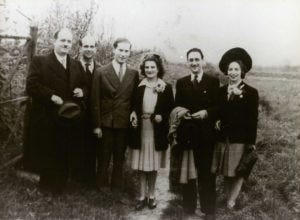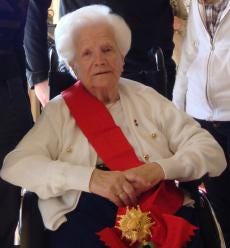I can’t write about resistance fighters during World War II and not mention the French Resistance. It is so fascinating that I just started reading about it and forgot that I had writing to do.
France had a very different history than other countries under German occupation in that they chose to collaborate with the Nazis. Yes, you read that right. So naturally, a vast French resistance movement arose, comprised of men and women from all facets of French society, from various economic statuses, religions, and political affiliations.
One of these fighters is our star for today.
Yvette Farnoux, born Yvette Jeannine Baumann on 17 October 1919 in the 16th arrondissement of Paris to a Jewish family from the Alsace region. Her father was a French army veteran from World War I. Her family was not observant, and Yvette didn’t know she was Jewish until she experienced antisemitism in high school.
The Nazis marched into Paris on 14 June 1940, and a year later, 21-year-old Yvette joined the Resistance, along with her brother Jean-Pierre and sister Claudine.
Yvette started with small confrontations like painting victory signs or the Cross of Lorraine (the Resistance symbol) on walls, changing street signs around to mislead Nazi vehicles, and obtaining food, clothes, and false documents for resistance fighters and Jewish families.
One day, Yvette was cycling in the La Défense area of Paris soon after the German occupation. Next to her was a column of about 30 tanks. Yvette recalls, “A very polite Nazi officer asked me for directions, so I said, ‘Follow me.’ I led them to the Place de la Défense, at the time a simple roundabout, took them around it once and back to where we started, then cycled away down an alleyway. I felt I’d done my little bit for France by wasting their time and fuel.”
Yvette was in charge of social services for the Mouvements Unis de la Résistance (MUR), a union of three large Resistance groups — Combat, Franc-tireurs (Sharpshooters), and Libération Sud. She was responsible for finding safe houses and food for Resistance fighters, their families, and Jews in hiding.
In October 1943, Yvette married clandestinely to Jean-Guy Bernard, a resistance fighter and General Secretary of the Combat movement alongside Henri Frenay.

Unfortunately, marital bliss wasn’t the destiny of this young brave couple. Yvette and her husband, Jean-Guy, were arrested on 28 January 1944. Held in separate cells, they would not reunite ever again. Jean-Guy died on a train to Auschwitz at the age of 26.
Yvette, eight months pregnant, was taken to interrogation by the Gestapo. She survived the brutal interrogations, but her baby did not. She was sent to Auschwitz and later Ravensbrück, an only-women camp.
In January 1945, as if Yvette didn’t endure enough, she and thousands of other women were forced out of the camp on a death march on foot to Czechoslovakia. Frozen, starved, sick, and weak, about two-thirds of the women died en route until the Soviet Red Army liberated the survivors in April 1945.
Yvette was among the survivors.
Life finally would bring some happiness to Yvette, who by now had survived two concentration camps and a death march.
After the war, Yvette married Abel Farnoux, a survivor of Buchenwald, who became a US lieutenant and was helping Holocaust survivors build their lives back after the war. Abel later served as an adviser to French prime minister Edith Cresson.
She was blessed with three children. “Having children was a great revenge against Naziism,” said Yvette in an interview.
Yvette dedicated most of her postwar life to helping the children of French resistance fighters or Jews who died during the war.
Yvette was the eighth French woman in history to be awarded the Grand Officer of the Legion of Honor and, later, the Grand Cross, the highest French order of merit.

She was acclaimed as a national heroine.
France’s president, prime minister, and the mayor of Paris issued official statements mourning her death when Yvette passed away on November 7th, 2015, at 96.
To Yvette and all the fierce women all there. May we know them. May we be them.
